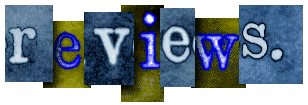

As he describes the strain of being the father of two young girls, a full-time breadwinner, and a struggling writer, he sounds like one of the characters in his futuristic novella Bounty -- namely, the scrappy father of nine who gallops about chanting his own mantra:
Nobody said it was going to be easy. And this is definitely not easy. Wow. These thorns sure hurt. But hey. You've got to get up and keep going. You snooze, you lose. Ouch. Yikes. Concentrate, concentrate.
Saunders and his wife met in the graduate writing program at Syracuse University, and they've been planning to move to Montana ever since. "It's a kind of pipe dream, but my girls are seven and five now, so I think we're here in New York for the duration. I traveled a lot in the bohemian mode when I was younger. When I finally got around to writing a road novel, I didn't have time to go anywhere. So I just picked up a map and worked my way west." In Bounty, Saunders's claw-footed hero makes tracks from upstate New York to Taos, New Mexico.
"I wanted to avoid any real political stuff," says Saunders, "because I'm not a political mind. Whenever I got to a place where -- in a conventional futuristic novel -- you'd go into lots of exposition, I'd make it purposefully vague and focus on the characters instead. I worked with this idea of how people are always being broadly classified as okay or not-okay. That's always being done, whether it's racial, gender, national, or whatever. If you get four people together, two of them are looking down on the other two."
Its futuristic setting is grim, Saunders says, but Bounty doesn't forecast anything. "A lot of early readers discussed it with a very straight face, as if I were laying claim to predicting the future," he says. "It's not meant to be predictive; it's a riff on human tendencies." Saunders considers Bounty a mix of road and anti-Utopian fiction and says he never even heard the word "dystopia" until after his novella was published last spring in Harper's.
A geophysical engineer, Saunders studied at the Colorado School of Mines -- "a sort of training ground for oil-field workers" -- and spent several years exploring for oil in the Sumatra jungle, where there was plenty of time to read and write fiction. "At first I'd imitate Conrad and Somerset Maugham because I was in Asia," he says. He soon grew to love contemporary writers like Thomas Pynchon -- "especially in Vineland, where he talks about things we all know, and it's exaggerated, and you can't read it as realism or as pure fantasy" -- and Toni Morrison, whose influence comes through in Bounty's slave-narrative subtext and in the ghostly characters who waft through the stories "CivilWarLand in Bad Decline" and "The Wavemaker Falters."
"I've designed myself to be a weirdo," says Saunders, "and my ideal reader is myself as though I'm reading it for the first time. Every time I say, `I want to write something silly,' things start to click. I wrote the first draft of `Offloading for Mrs. Schwartz' [about the goings-on in a virtual-reality shop] in two days -- it was a matter of two pots of coffee, two bottles of Boone Farm, and stay up 'til four in the morning. After that, I spent two months revising it because I have this anal thing about sentences." "Offloading" was purchased by the New Yorker before Tina Brown took over as editor, and she ran it with a Updike story in her first issue.
"Hopefully my writing sounds relaxed and off-the-cuff," Saunders chuckles. "It takes a lot of work to get it that way. CivilWarLand in Bad Decline's about 200 pages, and it took me about five years trying to boil everything down to a kernel. Maybe it's my Catholic upbringing: I don't want any waste."
Saunders describes his writing as "a spiritual discipline" and recalls bicycling home from work along the Erie Canal while writing Bounty and feeling "so grateful because the story was so much fun to do." He talks about his claw-foot hero's journey from total self-interest to self-sacrifice.
Could it be that George Saunders is hiding a neat little moral beneath all the smooth irony?
"I never really came alive until I told myself to take a hike," Saunders concludes. "When I was living for myself, I was a bore, and I didn't do nice things. When I got married and had kids, it suddenly became a moral universe again. When I was a kid, I'd wanted to be a saint. That went away for a long time. But then I got a family, and every action had importance."
-- JW
